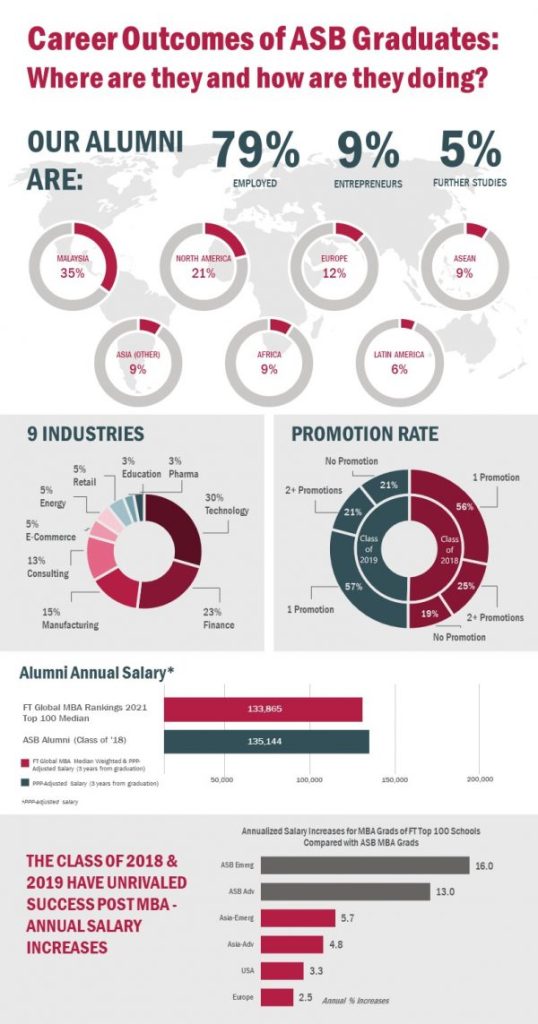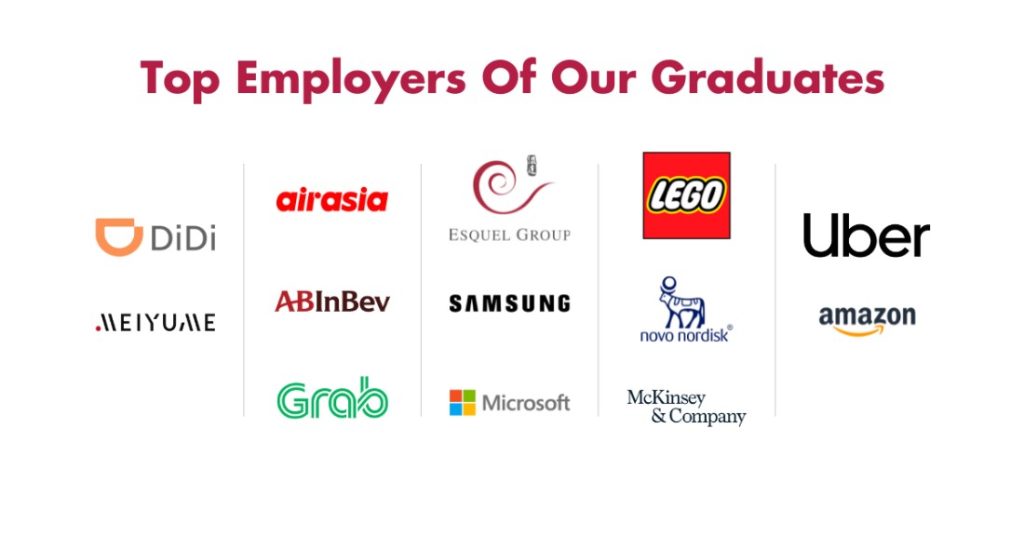As a start-up business school with a vision of delivering premier management education in and for the emerging world, ASB has a lot to prove. The school’s aspirations of combining the best of the East and the West, placing as heavy a focus on Action Learning (experiential learning) as a foundational business theory, and equipping students with future-proof Smart and Sharp skills (skills to work with other people and to work with machines) are lofty indeed.
Having only been around since 2016, ASB has graduated four classes since its inception. Yet despite the school’s young age, it has managed, through strong partnerships and a bold, unconventional marketing approach, to attract a diverse and talented student body that comprises over 70% international students and is almost 50% female.
If building a b-school from scratch was not hard enough, ASB faced even more challenges with the two most recent cohorts (Classes of 2020 and 2021) graduating in the middle of a pandemic. Despite the challenges, the school and students have been resilient with unforeseeable circumstances.
In late 2020, ASB ran a survey among the alumni of the first two cohorts (Classes of 2018 and 2019) to understand how they have been faring, about a year and a half to two and a half years after graduating, amid a pandemic. The survey results were encouraging and have validated the school’s approach to learning – ASB alumni have flourished after graduation. And those graduating students are making waves all over the world in their post-MBA roles. Let’s look at some of the outcomes from our two pioneering classes.

MBA as a launchpad into top tier companies… and more
An overwhelming majority (79%) of alums have chosen a career path with some of the worlds most recognizable global companies and leading Asian players such as AirAsia, Amazon, Grab, LEGO, McKinsey, Samsung, Uber, Novo Nordisk, and Microsoft. The rest of ASB alums have chosen alternate career paths, with a notable amount carrying on the entrepreneurial spirit of ASB and have choosing to venture into entrepreneurship (9%), founding their own startups.
The transformational management education experience has piqued the curiosity of a small but noteworthy minority of who have used the MBA as a launchpad to further their studies (5%) at top institutions such as MIT Sloan School of Management and Cornell University’s Johnson Graduate School of Management.

Asia matters everywhere – an MBA with global portability
There are many reasons our students choose an MBA in Asia. Many are excited to be immersed in the local cultures and languages on the frontier of the world’s fastest growing economic region. Some are looking for an adventure on the other side of the globe. But job opportunities for ASB graduates have not been limited only to the Asian region. Today, our graduates are in 35 different locations.
While the majority (53%) are based in Asia, many are based in other locations, reinforcing the value of ASB’s approach to management education and the value of Asian business perspective inside and outside Asia. The ASB MBA is globally portable. ASB has significant representation in all global markets: This includes both opportunities in top firms in advanced economies, as well as high-growth start-ups in emerging economies.
Trusted leaders and advisors to the C-suite and making an impact
Through our Action Learning-based curriculum, and the results of the five projects during the time in the MBA program, ASB graduates are able hit the ground running in any setting. 80% of our alums have been promoted at least once or more within three years from graduation. Over the same period, a quarter of ASB’s alums have been promoted twice. Our graduates have quickly become influential and are trusted advisors to top leadership, with 24% reporting directly to the C-suite.
Strong salary outcomes outpace top-tier schools
The market has placed a tremendous value on ASB MBA graduates for their ability as change makers and having an impact. They are being rewarded financially as well, achieving annualized salary growth of 13% and 16% in advanced and emerging economies respectively. This vastly outperforms the annualized salary progression of Financial Times Top 100 Global MBA Ranking 2021 in Developing Asia (5.7%), USA (3.3%), and Europe (2.5%).
With COVID-19, the 2020 market is closer to 2018 than 2019 as firms were tightening hiring processes to strengthen businesses in the new normal. Despite this, 94% of the Class of 2020 accepted offers that averaged a still-impressive PPP-adjusted salary of $103,915.
*PPP-adjusted – An approach to measuring the purchasing power of different currencies (salaries) based on the basket of goods that can be purchased in different markets.
Finance, manufacturing, and consulting stay popular, but tech tops the list
The most popular industry that Classes of 2018 and 2019 graduates have ventured into post-MBA is technology (30%). Graduates have joined prominent technology giants, such as Microsoft and Samsung, as well as rising technology start-ups. Many have transitioned into tech without prior experience in the sector, showing the versatility of the Smart and Sharp skills that the ASB MBA equipped them with.
For example, Rafael from Class of 2020 joined Samsung’s Leadership Development Program upon graduation, making a switch from the auto industry to the technology industry. Meanwhile, Ashley Suelyn from Class of 2020 started her career as an underwriter, holding an Actuarial Science degree, and used her MBA to pivot towards corporate strategy, business development, and project management as the current Chief of Staff of Malaysian startup SOCAR.
Nura Adila Asri from Class of 2019 came from the world of audit and assurance and transitioned into tech startup GoGet, leveraging her previous experience to lead in finance and community management functions. Finance remained to be the second most popular industry (23%) with almost one quarter of graduates accepting roles across various functions. Manufacturing (15%) and consulting (13%) also among the top industries that ASB graduates venture into. Other than these popular industries, graduates are also in e-commerce/retail, energy, education, and pharmaceutical industries.
A transformative experience on multiple dimensions
The ASB MBA is designed to be an immersive and transformative program. Students are physically located in the heart of Southeast Asia, spend a month in Cambridge, Massachusetts at MIT Sloan, and take part in five different applied Action Learning projects with four different employers, with the fifth project being focused on entrepreneurship and new product/service development. This equips them not only with future-proof skills but also a strong and extensive global network.
To date, ASB has worked with . In the Entrepreneurship Trek where students ideate and prototype their own products and services, they pitch and get feedback from a panel of judges from industry. The trek has resulted in some students continuing to work on developing and launching their projects while seeking funding. One of these projects, BlindIn.co, resulted in the student team winning Microsoft’s first virtual AI for Accessibility Hackathon (APAC).
They scored $1,000 in cash prizes, the opportunity to work with Microsoft experts to build their solutions on Microsoft Azure and are now working to have their solution available on the Microsoft marketplace. Beyond reshaping the way students look at their careers, many students have reported the program to be a transformative experience on a personal level as well. Students transform into Smart and Sharp leaders and learn to cultivate strong communication skills, empathy, and cultural awareness.
As a testament to this, in the recent survey, alumni rated the program experience highly. On a 5-point Likert scale, the majority of ASB graduates have rated Action Learning highly in terms of impact on career (4.45). This is followed by a high rating on overall academic experience (4.39), quality of instruction (4.35), quality of faculty (4.29), and overall quality of MBA (4.26). Overall, 94% of graduates said the ASB MBA met or exceeded expectations, and 90% said they would likely or very likely recommend the ASB MBA.





